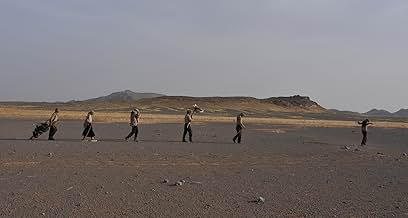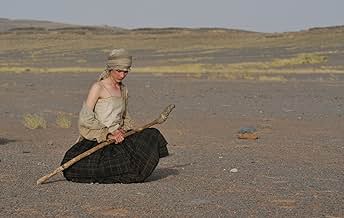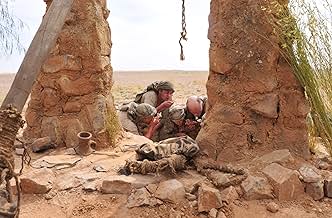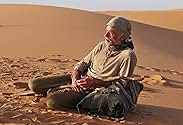Os fugitivos do gulag siberiano viajam quatro mil milhas a pé para a liberdade na Índia.Os fugitivos do gulag siberiano viajam quatro mil milhas a pé para a liberdade na Índia.Os fugitivos do gulag siberiano viajam quatro mil milhas a pé para a liberdade na Índia.
- Direção
- Roteiristas
- Artistas
- Indicado a 1 Oscar
- 4 vitórias e 5 indicações no total
Gustaf Skarsgård
- Voss
- (as Gustaf Skarsgard)
Zachary Baharov
- Interrogator
- (as Zahari Baharov)
Sally Brunski
- Janusz's Wife, 1939
- (as Sally Edwards)
Dejan Angelov
- Andrei
- (as Deyan Angelov)
Mariy Rosen
- Lazar
- (as Marii Grigorov)
Nikolay Stanoev
- Yuri
- (as Nikolai Stanoev)
- Direção
- Roteiristas
- Elenco e equipe completos
- Produção, bilheteria e muito mais no IMDbPro
Avaliações em destaque
90U
I think it's always difficult to portray hardship and endurance in films purely because you only experience it for a couple of hours or so. This had me understanding the terrible conditions for real....i think. The search for water in the Gobi desert had me thinking twice about attempting the same thing as a holiday. Make up was fantastic and the bleakness of the scenery was soo beautiful
I mean these men escaped a Russian gulag and WALKED 4,000 miles from Siberia to India, come on...
So this movie is based on the 1959 memoir "The Long Walk" (of which there is some debate over its validity). Regardless I really enjoyed it, the story is incredible and I'd been looking foreword to seeing what they would do in the movie version. Throw in a top notch cast as our Siberian gulag escapees (Colin Farrell, Ed Harris, Jim Sturgess) and this should have been fantastic. All I can say there is maybe my expectations were too high because honestly I came away a little disappointed, actually preferring the book.
The movie itself was very long and kind of jumped around. Granted they had a lot of material to cover as our men escape under cover of a snowstorm and undertake a treacherous journey across thousands of miles of hostile terrain. They face freezing nights, lack of food and water, injuries, mosquitoes, an endless desert, the Himalayas, and moral questions of when to leave someone behind.
The cinematography is beautiful, the scenery breathtaking and everyone does a great job. Ed Harris is excellent as the American Mr. Smith (love him) and Colin Ferrell (love him a bit more) was awesome as a tattooed gang-style prisoner, with an amazing Russian accent. As a point of interest his character is not in the book. The scenes in the blizzard and the Gobi desert stand out to me and are brutal but well done. 08.11
So this movie is based on the 1959 memoir "The Long Walk" (of which there is some debate over its validity). Regardless I really enjoyed it, the story is incredible and I'd been looking foreword to seeing what they would do in the movie version. Throw in a top notch cast as our Siberian gulag escapees (Colin Farrell, Ed Harris, Jim Sturgess) and this should have been fantastic. All I can say there is maybe my expectations were too high because honestly I came away a little disappointed, actually preferring the book.
The movie itself was very long and kind of jumped around. Granted they had a lot of material to cover as our men escape under cover of a snowstorm and undertake a treacherous journey across thousands of miles of hostile terrain. They face freezing nights, lack of food and water, injuries, mosquitoes, an endless desert, the Himalayas, and moral questions of when to leave someone behind.
The cinematography is beautiful, the scenery breathtaking and everyone does a great job. Ed Harris is excellent as the American Mr. Smith (love him) and Colin Ferrell (love him a bit more) was awesome as a tattooed gang-style prisoner, with an amazing Russian accent. As a point of interest his character is not in the book. The scenes in the blizzard and the Gobi desert stand out to me and are brutal but well done. 08.11
This is a wonderful film that is completely unpretentious, has no explosions, maltreated corpses or dramatic emotional outbursts, but a stringent and focused narrative, good camera work and above all great actors, all together as an ensemble. And even though we know that Ed Harris and Colin Farrell are always worth their money, especially Farrell as a Russian criminal is an absolute highlight. How he goes from being brutal, then self-doubting to a social being is very well directed by Peter Weir, but played by Farrell in a truly stunning way. Halfway through the film, a fresh, new color comes into play with Saoirse Ronan. Weir builds up the story well, maybe the hike through the Himalayas is a little too short, but at that point we already understood what drives the small troop of survivalists. A true gem.
So the book has been proved false. Does this mean that the "true story" isn't true after all? There have been many claims by others that it is fact instead of fiction. Whatever - it doesn't matter, Peter Weir's "The Way Back", this movie about that book, which tells the tale of gulag escapees and their harrowing journey to freedom, is a well-told and inspiring tale than anything else.
All of the actors are terrific in their roles - Jim Sturgess as the de- facto leader of the bunch, showing a more improved and mature side to his acting since "21"; Ed Harris as the gruff American Smith, who is hard-edged and iron-willed until he eventually befriends...; Saiorse Ronan as Irene, the runaway girl who joins them on their quest - Ronan here shows a perfect balance of various emotions while not overdoing it like many child stars her age... she definitely is one of the best young actresses today; Colin Farrell as the violent yet humorous soldier who protects the team from danger in Siberia and provides comic relief when needed - Farrell shows that he can be tough yet likable at the same time without being completely overblown and shows his versatility as an actor; European actors Dragos Bucur, Alexandru Potocean, Sebastian Urzendowsky and Gustaf Skarsgård round off the remaining escapees and they all acted great in their respective and differing roles. The chemistry between all of the actors at parts are great.
Having said that, the film's only flaw is that it sacrificed substantial characterization for realism and visual spectacles. The characters are thinly but not overly so fleshed out, and the interactions between them are short before the next walking shot. But when it comes to realism and believability the film succeeds. I was surprised when I saw National Geographic was one of the co-producers of the film, but I wasn't as soon as I saw how realistic the depictions of survival the characters did in the film. Men will do anything to escape to freedom, and the determination and spirit to survive in a harsh and unforgiving natural world, is what Weir and his script is trying to say, but the walking parts are written in masterful detail that any line of dialog may ruin it, so silence is sometimes golden in these parts. The screenplay also challenges the usual Hollywood clichés that usually are found in this film genre, and it transforms them into better, more realistic and sometimes unsettling situations.
Production-wise, the film is a triumph. The production design is great and makes extremely well use of real locations. The cinematography by Russell Boyd is dazzling, simply marvelous, it is wide, sweeping and epic, with lush scenery of forests, deserts and the snow-peaked Himalayas exquisitely shot throughout. The wide cinematography makes the experience even more harrowing thanks to Lee Smith's fluid and crisp editing and Burkhard Dallwitz's great music score and terrific music timing - Dallwitz and Weir know when and how music/sound can be used in a scene, and that sometimes, silence is crucial to certain moments. Here, Weir uses that silence to terrific and very intense effect, and with his extremely focused direction, manages to being out a very exhilarating and at the same time excruciating (in a good way) experience. So much so that I forgot about the controversy surrounding the "true story" and found myself hugely engrossed in the movie, not wanting it to end.
In short, the film lightly suffers from lack of proper characterization, but is heavy on almost everything else - acting, directing, cinematography, production value and music. If it had proper characterization, it would have been an instant classic and a contender for the Best Picture Oscar. Still, as it stands, "The Way Back" is still an epic adventure; an inspiring, sometimes funny, and often intense and harrowing experience that also proves that Peter Weir is still an ambitious tour-de-force filmmaker.
Overall rating: 77/100
All of the actors are terrific in their roles - Jim Sturgess as the de- facto leader of the bunch, showing a more improved and mature side to his acting since "21"; Ed Harris as the gruff American Smith, who is hard-edged and iron-willed until he eventually befriends...; Saiorse Ronan as Irene, the runaway girl who joins them on their quest - Ronan here shows a perfect balance of various emotions while not overdoing it like many child stars her age... she definitely is one of the best young actresses today; Colin Farrell as the violent yet humorous soldier who protects the team from danger in Siberia and provides comic relief when needed - Farrell shows that he can be tough yet likable at the same time without being completely overblown and shows his versatility as an actor; European actors Dragos Bucur, Alexandru Potocean, Sebastian Urzendowsky and Gustaf Skarsgård round off the remaining escapees and they all acted great in their respective and differing roles. The chemistry between all of the actors at parts are great.
Having said that, the film's only flaw is that it sacrificed substantial characterization for realism and visual spectacles. The characters are thinly but not overly so fleshed out, and the interactions between them are short before the next walking shot. But when it comes to realism and believability the film succeeds. I was surprised when I saw National Geographic was one of the co-producers of the film, but I wasn't as soon as I saw how realistic the depictions of survival the characters did in the film. Men will do anything to escape to freedom, and the determination and spirit to survive in a harsh and unforgiving natural world, is what Weir and his script is trying to say, but the walking parts are written in masterful detail that any line of dialog may ruin it, so silence is sometimes golden in these parts. The screenplay also challenges the usual Hollywood clichés that usually are found in this film genre, and it transforms them into better, more realistic and sometimes unsettling situations.
Production-wise, the film is a triumph. The production design is great and makes extremely well use of real locations. The cinematography by Russell Boyd is dazzling, simply marvelous, it is wide, sweeping and epic, with lush scenery of forests, deserts and the snow-peaked Himalayas exquisitely shot throughout. The wide cinematography makes the experience even more harrowing thanks to Lee Smith's fluid and crisp editing and Burkhard Dallwitz's great music score and terrific music timing - Dallwitz and Weir know when and how music/sound can be used in a scene, and that sometimes, silence is crucial to certain moments. Here, Weir uses that silence to terrific and very intense effect, and with his extremely focused direction, manages to being out a very exhilarating and at the same time excruciating (in a good way) experience. So much so that I forgot about the controversy surrounding the "true story" and found myself hugely engrossed in the movie, not wanting it to end.
In short, the film lightly suffers from lack of proper characterization, but is heavy on almost everything else - acting, directing, cinematography, production value and music. If it had proper characterization, it would have been an instant classic and a contender for the Best Picture Oscar. Still, as it stands, "The Way Back" is still an epic adventure; an inspiring, sometimes funny, and often intense and harrowing experience that also proves that Peter Weir is still an ambitious tour-de-force filmmaker.
Overall rating: 77/100
I am very surprised that this movie was ever made. After all, the world has seldom really talked about Soviet gulags and it's not like this is a fun or cinematic topic. In addition, it took a lot of trouble to create the sets and film in places such as Bulgaria, Mongolia and India.
The story begins in 1940 in a prison camp in Siberia. The purpose of the camp is to essentially work the prisoners to death and hundreds of them were spread throughout the old Soviet Union. Knowing that they won't survive for long, a small group of prisoners plan an escape. The problem is that such an escape seems impossible, as it is many thousands of miles to freedom....through Siberia and the Gobi Desert in Mongolia AND the Himalayas to freedom in India.
This story is based on a book by a person who claims to have done such an escape. However, the voracity of this account is highly questionable and so the film does not purport to be any one person's tale but a fictionalization of what could have occurred.
The story is very slow and methodical but it also is never dull. I credit that with an excellent script as well as direction by Peter Weir. As for the acting, it was exceptional as well...gritty, realistic and tough. Overall, a rather amazing movie...well worth seeing and important because it brings to light the evil of the Soviet gulag system.
The story begins in 1940 in a prison camp in Siberia. The purpose of the camp is to essentially work the prisoners to death and hundreds of them were spread throughout the old Soviet Union. Knowing that they won't survive for long, a small group of prisoners plan an escape. The problem is that such an escape seems impossible, as it is many thousands of miles to freedom....through Siberia and the Gobi Desert in Mongolia AND the Himalayas to freedom in India.
This story is based on a book by a person who claims to have done such an escape. However, the voracity of this account is highly questionable and so the film does not purport to be any one person's tale but a fictionalization of what could have occurred.
The story is very slow and methodical but it also is never dull. I credit that with an excellent script as well as direction by Peter Weir. As for the acting, it was exceptional as well...gritty, realistic and tough. Overall, a rather amazing movie...well worth seeing and important because it brings to light the evil of the Soviet gulag system.
Você sabia?
- CuriosidadesThis movie was inspired by the memoir of Slavomir Rawicz depicting his escape from a Siberian gulag and subsequent four thousand-mile walk to freedom in India. Incredibly popular, it sold over five hundred thousand copies, and is credited with inspiring many explorers. However, in 2006, the BBC unearthed records (including some written by Rawicz) that showed he had been released by the U.S.S.R. in 1942. In 2009, another former Polish soldier, Witold Glinski, claimed that the book was really an account of his own escape. However, this claim too has been seriously challenged.
- Erros de gravaçãoJanusz demonstrates a method using shadows of a stick and rock to find the compass direction of south. Yet, many of the scenes show them walking in a direction inconsistent with sun angles i.e. sun at their backs, which would have them walking north.
- ConexõesFeatured in Breakfast: Episode dated 7 December 2010 (2010)
Principais escolhas
Faça login para avaliar e ver a lista de recomendações personalizadas
Detalhes
- Data de lançamento
- Países de origem
- Idiomas
- Também conhecido como
- Camino a la libertad
- Locações de filme
- Empresas de produção
- Consulte mais créditos da empresa na IMDbPro
Bilheteria
- Orçamento
- US$ 30.000.000 (estimativa)
- Faturamento bruto nos EUA e Canadá
- US$ 2.701.859
- Fim de semana de estreia nos EUA e Canadá
- US$ 1.218.868
- 23 de jan. de 2011
- Faturamento bruto mundial
- US$ 24.172.201
- Tempo de duração2 horas 13 minutos
- Cor
- Mixagem de som
- Proporção
- 2.35 : 1
Contribua para esta página
Sugerir uma alteração ou adicionar conteúdo ausente

























